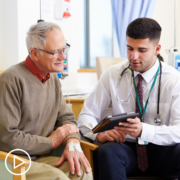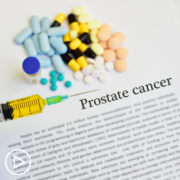Overcoming Barriers to Quality Prostate Cancer Care
Overcoming Barriers to Quality Prostate Cancer Care from Patient Empowerment Network on Vimeo.
What barriers can impact access to clinical trials and quality prostate cancer care? Dr. Sumit Subudhi shares helpful advice for addressing these issues by sharing information about financial support, diversity resources, and travel assistance to aid in access to care and clinical trials.
Dr. Sumit Subudhi is an Associate Professor in the Department of Genitourinary Medical Oncology, Division of Cancer Medicine at The University of Texas MD Anderson Cancer Center. Learn more about Dr. Subudhi.
See More From Prostate Clinical Trials 201
Related Resources

|

|

|
Transcript:
Katherine:
Are there barriers that interfere with patients’ access to clinical trials? I think you touched on this but maybe if you have anything to add.
Dr. Subudhi:
Yeah. So, travel can be a major barrier. And that’s something that the pharmaceutical industry understands. And, therefore, some of the trials, especially the multicenter trials, actually allow for travel cost. That sometimes includes flights, driving, hotels, food.
So, that’s something that’s important to ask because sometimes when we’re thinking about clinical trials, we’re so anxious in the doctor’s office. And then it’s not until we go back home when we’re trying to figure out how do we get the resources to come so frequently. You’ll find out that’s sometimes travel costs.
The other thing is underrepresented minorities are something that we’ve been doing a relatively poor job recruiting to our clinical trials. Part of that is just from history that we didn’t have the safety rules in place that we do now. And underrepresented minorities were affected negatively in some of the earlier trials.
And the other thing is just the resources of getting to and from their homes to our cancer site as often as they need to because they may be the sole breadwinner in their homes and things like that. So, there are resources to try to help do this. But I still think we have to do a better job.
Katherine:
Can trials be coordinated between a local doc and the institution?
Dr. Subudhi:
So, most trials cannot. Most. But there are some that can. So, if it’s a standard of care treatment, sometimes we can have the safety visits done with the local doctors. But every time they’re going to get the treatment they have to come see us at the institution that is actually running the trial.
But most of the time, what I tell all my patients is, “I want them to have a local doctor.” Because if there’s something that happens in the middle of the night, I want to be able to say, “You’re going to go to this emergency room where this doctor works.” And then when they go there, as soon as they get admitted into the emergency room center, I talk to the ER doctor, and I say, “This is what I want to be done. These are how these drugs work.”
Because they’re not going to know what these experimental drugs are. They’re not available in the community. So, I just think it’s important to have communication, especially for our patients that are out of state. MD Anderson is in Houston, Texas. And Texas is so big that a lot of my patients live six to eight hours away, and they’re still in Texas.
Katherine:
So, what are your thoughts on what could be done to overcome the barriers that some patients are experiencing? And are there resources available?
Dr. Subudhi:
So, the pharmaceutical companies are putting in more financial resources as well as a diversity resource. And when I say diversity resources, those outreach programs just to make sure that the communities that are underserved are hearing about the clinical trials because if you don’t hear about it you’re never going to join it. So, one thing is just knowledge.
And then, number two, we’re trying to create financial resources. For example, there’s Angel Flight as one example where they will pay for the flight for you. And they’ll put you on maybe a chartered plane or something or a smaller plane to defray the cost of traveling by air. So, there are things out there, but we still need a lot more.
Katherine:
But one thing patients could do is talk to their healthcare team about what resources are available for them.
Dr. Subudhi:
Absolutely. Absolutely.
Katherine:
Before we end the program, Dr. Subudhi, I’d like to get your final thoughts. What message do you want to leave the audience with related to clinical trial participation?
Dr. Subudhi:
First of all, thank you for even thinking about it. That’s the one big step. And for those of you who actually take the next step and actually join a clinical trial, again, thank you for being so brave.
I think it’s a gift that you’re giving to other fellow patients with cancer. And it’s also a gift that you’re giving to the scientific and medical community, because we are learning by your participation in the trial. And I want you to know whether the trial worked for you or does not work for you, regardless, we’re going to learn something that’s going to help change outcomes in your cancer.



